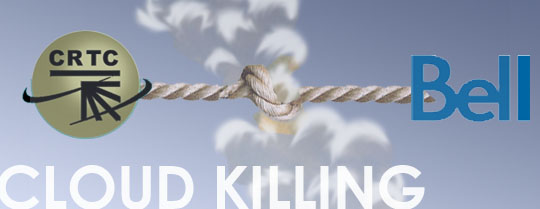Usage-based billing okayed by CRTC
 The CRTC has unsurprisingly sided with Bell, and is allowing the big blue telco to go ahead with it’s usage-based billing scheme, and yes, scheme is the most appropriate word here. Not only does it mean that Bell gets to charge it’s own customers, who are already paying through the nose for parltry data caps, but now big blue can hit 3rd party suppliers, like TekSavvy and Acanac with fees that look downright preposterous.
The CRTC has unsurprisingly sided with Bell, and is allowing the big blue telco to go ahead with it’s usage-based billing scheme, and yes, scheme is the most appropriate word here. Not only does it mean that Bell gets to charge it’s own customers, who are already paying through the nose for parltry data caps, but now big blue can hit 3rd party suppliers, like TekSavvy and Acanac with fees that look downright preposterous.
Bell has complained about traffic congestion, caused mostly by heavy file sharing, but as their own data has shown, as far back as 2 years ago, this is an absolute myth. In an attempt to appear ‘fair’ the CRTC DID impose a restriction that Bell couldn’t impose UBB on the wholesalers until it had moved all it’s own retail customers to it. I’m sure Bell feels REALLY upset about this.
Using a flat fee with overages model, 5mbps customers get a whopping 60 gigabytes a month, after which Bell will charge $1.12 per GB to a maximum of $22.50, which means an additional 20 GB. Surpass the 300 GB/m level, and you can start tacking on an additonal charge of 75 cents per gigabyte.
The Godfather… ahem… CRTC is also requiring Bell to supply “usage insurance plans,” which give its own retail customers extra monthly usage for a small fee… I guess if you KNOW you’re gonna go over, you might as well pay the vig.
In a case like this, you’d think that a dissenting vote on the CRTC would be a good thing, but CRTC commissioner Candice Molnar said the requirement on Bell to move all of its customers off unlimited downloading plans was unnecessary because a vast majority are already on usage-based services.
Sure kick the internet when it’s down. Thanks.




[…] consultation, especially one with the title Obligation to Serve, would be the easy approach, given some of the CRTC’s past decisions regarding internet services. I’ll try not to be though, […]
[…] have arisen if it weren’t for Bell petitioning the CRTC in the first place. Even so, the UBB ruling may never have come to pass if the CRTC actually looked at the issue from a more technical […]